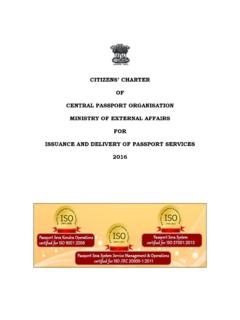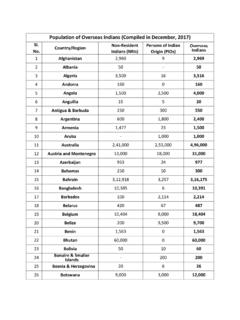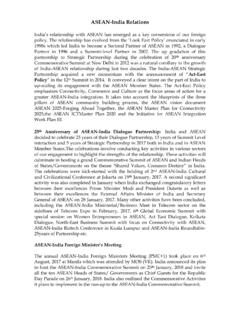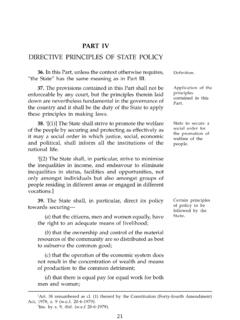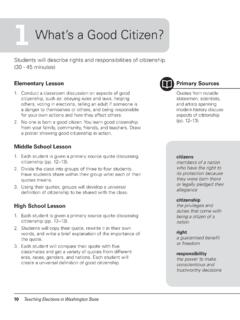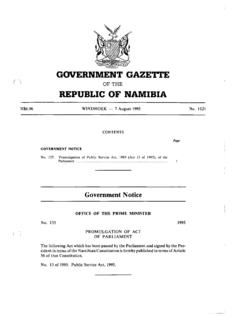Transcription of PART III - Ministry of External Affairs
1 PART IIIFUNDAMENTAL RIGHTSG eneral12. In this Part, unless the context otherwise requires, the State includes the Government and Parliament ofIndia and the Government and the Legislature of each ofthe States and all local or other authorities within theterritory of India or under the control of the Governmentof (1) All laws in force in the territory of Indiaimmediately before the commencement of this Constitution,in so far as they are inconsistent with the provisions of thisPart, shall, to the extent of such inconsistency, be void.(2) The State shall not make any law which takes awayor abridges the rights conferred by this Part and any lawmade in contravention of this clause shall, to the extent ofthe contravention, be void.
2 (3) In this article, unless the context otherwiserequires, (a) law includes any Ordinance, order, bye-law,rule, regulation, notification, custom or usage havingin the territory of India the force of law;(b) laws in force includes laws passed or made bya Legislature or other competent authority in theterritory of India before the commencement of thisConstitution and not previously repealed,notwithstanding that any such law or any part thereofmay not be then in operation either at all or inparticular [(4) Nothing in this article shall apply to anyamendment of this Constitution made under article 368.]
3 ]Right to Equality14. The State shall not deny to any person equalitybefore the law or the equal protection of the laws within theterritory of inconsistentwith or inderogation of thefundamental by the Constitution (Twenty-fourth Amendment) Act, 1971, s. (1) The State shall not discriminate against anycitizen on grounds only of religion, race, caste, sex, placeof birth or any of them.(2) No citizen shall, on grounds only of religion, race,caste, sex, place of birth or any of them, be subject to anydisability, liability, restriction or condition with regard to (a) access to shops, public restaurants, hotels andplaces of public entertainment; or(b) the use of wells, tanks, bathing ghats, roadsand places of public resort maintained wholly orpartly out of State funds or dedicated to the use ofthe general public.
4 (3) Nothing in this article shall prevent the State frommaking any special provision for women and [(4) Nothing in this article or in clause (2) of article 29shall prevent the State from making any special provisionfor the advancement of any socially and educationallybackward classes of citizens or for the Scheduled Castesand the Scheduled Tribes.]2[(5) Nothing in this article or in sub-clause (g) ofclause (1) of article 19 shall prevent the State from makingany special provision, by law, for the advancement ofany socially and educationally backward classes ofcitizens or for the Scheduled Castes or the ScheduledTribes in so far as such special provisions relate to theiradmission to educational institutions including privateeducational institutions, whether aided or unaided bythe State, other than the minority educational institutionsreferred to in clause (1) of article 30.]
5 ]16. (1) There shall be equality of opportunity for allcitizens in matters relating to employment or appointmentto any office under the State.(2) No citizen shall, on grounds only of religion, race,caste, sex, descent, place of birth, residence or any ofthem, be ineligible for, or discriminated against in respectof, any employment or office under the State.(3) Nothing in this article shall prevent Parliamentfrom making any law prescribing, in regard to a class orclasses of employment or appointment to an officeTHE CONSTITUTION OF INDIA(Part III. Fundamental rights . Arts. 15-16.)Prohibition ofdiscrimination ongrounds ofreligion, race,caste, sex or placeof ofopportunity inmatters of by the Constitution (First Amendment) Act, 1951, s.
6 By the Constitution (Ninety-third Amendment) Act, 2005, s. 2 ( 20-1-2006).1[under the Government of, or any local or other authoritywithin, a State or Union territory, any requirement as toresidence within that State or Union territory] prior tosuch employment or appointment.(4) Nothing in this article shall prevent the State frommaking any provision for the reservation of appointmentsor posts in favour of any backward class of citizens which,in the opinion of the State, is not adequately representedin the services under the [(4A) Nothing in this article shall prevent the Statefrom making any provision for reservation 3[in mattersof promotion, with consequential seniority, to any class]or classes of posts in the services under the State in favourof the Scheduled Castes and the Scheduled Tribes which,in the opinion of the State, are not adequately representedin the services under the State.]
7 ]4[(4B) Nothing in this article shall prevent the Statefrom considering any unfilled vacancies of a year whichare reserved for being filled up in that year in accordancewith any provision for reservation made under clause (4)or clause (4A) as a separate class of vacancies to be filledup in any succeeding year or years and such class ofvacancies shall not be considered together with thevacancies of the year in which they are being filled up fordetermining the ceiling of fifty per cent. reservation ontotal number of vacancies of that year.](5) Nothing in this article shall affect the operation ofany law which provides that the incumbent of an officein connection with the Affairs of any religious ordenominational institution or any member of thegoverning body thereof shall be a person professing aparticular religion or belonging to a Untouchability is abolished and its practice inany form is forbidden.
8 The enforcement of any disabilityarising out of Untouchability shall be an offencepunishable in accordance with (1) No title, not being a military or academicdistinction, shall be conferred by the State.(2) No citizen of India shall accept any title from anyforeign CONSTITUTION OF INDIA(Part III. Fundamental rights . Arts. 16 18.)81 Subs. by the Constitution (Seventh Amendment) Act, 1956, s. 29 and Sch., for underany State specified in the First Schedule or any local or other authority within its territory, anyrequirement as to residence within that State .2 Ins. by the Constitution (Seventy-seventh Amendment) Act, 1995, s.
9 By the Constitution (Eighty-fifth Amendment) Act, 2001, s. 2, for certain words( 17-6-1995).4 Ins. by the Constitution (Eighty-first Amendment) Act, 2000, s. 2 ( 9-6-2000).Abolition of CONSTITUTION OF INDIA(Part III. Fundamental rights . Arts. 18-19.)9(3) No person who is not a citizen of India shall,while he holds any office of profit or trust under theState, accept without the consent of the President anytitle from any foreign State.(4) No person holding any office of profit or trustunder the State shall, without the consent of the President,accept any present, emolument, or office of any kindfrom or under any foreign to Freedom19.
10 (1) All citizens shall have the right (a) to freedom of speech and expression;(b) to assemble peaceably and without arms;(c) to form associations or unions;(d) to move freely throughout the territory of India;(e) to reside and settle in any part of the territoryof India; 1[and] 2* * * * *(g) to practise any profession, or to carry on anyoccupation, trade or [(2) Nothing in sub-clause (a) of clause (1) shall affectthe operation of any existing law, or prevent the Statefrom making any law, in so far as such law imposesreasonable restrictions on the exercise of the rightconferred by the said sub-clause in the interests of 4[thesovereignty and integrity of India,] the security of theState, friendly relations with foreign States, public order,decency or morality, or in relation to contempt of court,defamation or incitement to an offence.]
